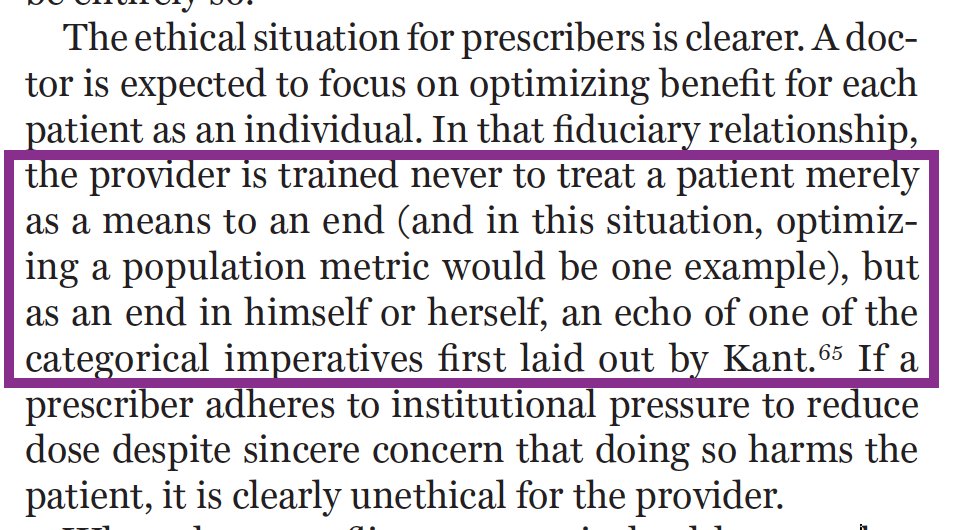
“Why did so many physicians become Nazis?” – this new essay bears on us, the non-Nazi doctors. In short, “science” can be invoked by immoral agents, & science language can seduce us into societal plans that override our duties to individuals @tabletmag /1 tabletmag.com/sections/histo…
Germany was extreme, of course.
Over 50% of doctors joined the Nazi party. There, Jews, gays & disabled persons were designated a disease on the German “body”. Ridding Germany of them was seen as good science.
We need not project the US will follow that, ever /2
Over 50% of doctors joined the Nazi party. There, Jews, gays & disabled persons were designated a disease on the German “body”. Ridding Germany of them was seen as good science.
We need not project the US will follow that, ever /2
But the US & other nations have not been alien to an immoral use of science-based authority.
Germany’s Laws for the Prevention of Genetically Diseased Offspring were based on American laws, passed earlier. We should all know about Tuskegee
/3 cdc.gov/tuskegee/timel…
Germany’s Laws for the Prevention of Genetically Diseased Offspring were based on American laws, passed earlier. We should all know about Tuskegee
/3 cdc.gov/tuskegee/timel…
In the Nazi example, the good of society eclipsed the good of individuals.
A founder of #bioethics, Pellegrino, detailed the(evil) premise:“that law takes precedence over ethics, that the good of the many is more important than the good of the few”
How do we prevent that? /4
A founder of #bioethics, Pellegrino, detailed the(evil) premise:“that law takes precedence over ethics, that the good of the many is more important than the good of the few”
How do we prevent that? /4
The 1st protection for health professionals is “personalism” – reverence for individual human life.
“No contingent factor, race, religion, economic status, disability or actions of the past, present or future” should "rob a person of the dignity she is owed” (A. Fernandes) /5
“No contingent factor, race, religion, economic status, disability or actions of the past, present or future” should "rob a person of the dignity she is owed” (A. Fernandes) /5
Fernandes names threats to personalism. Some *will* draw disagreement: forced sterilization of prisoners, abortion for eugenics, abortion overall, capital punishment.
US-detained immigrants are reported to have undergone forced gynecologic procedures/6 : theguardian.com/us-news/2020/d…
US-detained immigrants are reported to have undergone forced gynecologic procedures/6 : theguardian.com/us-news/2020/d…
A 2nd protection is conscience. But I confess to struggling with this one:
A conscience protection might spur a pharmacist to not honor a contraceptive Rx ☹️
It might spur another to help a drug user buy clean needles despite laws *prohibiting that protective act* 👍 /7
A conscience protection might spur a pharmacist to not honor a contraceptive Rx ☹️
It might spur another to help a drug user buy clean needles despite laws *prohibiting that protective act* 👍 /7
The 3rd protection against Nazi-like doctors is seeing that science cannot answer “using its own methodology- whether a particular medical practice is *morally* good”.
Quoting Einstein:
“the intellect has a sharp eye for methods and tools, but is blind to ends and values” /8
Quoting Einstein:
“the intellect has a sharp eye for methods and tools, but is blind to ends and values” /8
4th: health professionals might (we hope) resist dehumanization.
The death of Dr. Susan Moore & the rejection of her pain complaints, and the role of her race in her care, comes to mind
see @NPRKelly /9 npr.org/2020/12/30/951…
The death of Dr. Susan Moore & the rejection of her pain complaints, and the role of her race in her care, comes to mind
see @NPRKelly /9 npr.org/2020/12/30/951…
I would say Society-wide pressure to mandate Rx #opioid stoppage has invited de-personalization, i.e. pushing Rx pill changes without attending to human outcomes.
What is "good" in health care, *other* than protecting life?
/10
What is "good" in health care, *other* than protecting life?
/10
https://twitter.com/ZachWritesStuff/status/1343237039932780544?s=20
The 5th protection for health professionals is that a provider should
“serve the patient exclusively- not some abstracted idea of ‘society’.”
In the Holocaust, professionals “decided that the good of the racial state took precedence over the good of individual persons” /11
“serve the patient exclusively- not some abstracted idea of ‘society’.”
In the Holocaust, professionals “decided that the good of the racial state took precedence over the good of individual persons” /11
But, I note reality..there is no way for me to care for individual patients without *any* societal considerations. Evidence on what's the “best thing for this patient” can be unclear.
And I work in a world of stakeholders, regulators &payers who are empowered by *all of us* /12
And I work in a world of stakeholders, regulators &payers who are empowered by *all of us* /12
Still – my experience of navigating opioid discussions has sometimes left me with the impression that some lives, persons with disability, with dark skin and with pain, have commanded less respect than abstract goals
I think we all must push back on that... /13
I think we all must push back on that... /13
You need not be in any agreement with me, or with Dr. Ashley Fernandes, to recognize that he's got a worthy essay on how science language, and medical authority, can be deployed toward immoral and unethical ends. /FIN
tabletmag.com/sections/histo…
tabletmag.com/sections/histo…
I hope a few people take a look at the thread, and at the piece from @tabletmag @tal7291 @NCQA @tal7291 @uche_blackstock @SMeghani_PhD @maiasz @RutiRegan @DrZackaryBerger @jabarocas @thomaschattwill @hastingscenter @davidthekick @PainPtFightBack @speakingabtpain @BrianMannADK
• • •
Missing some Tweet in this thread? You can try to
force a refresh









